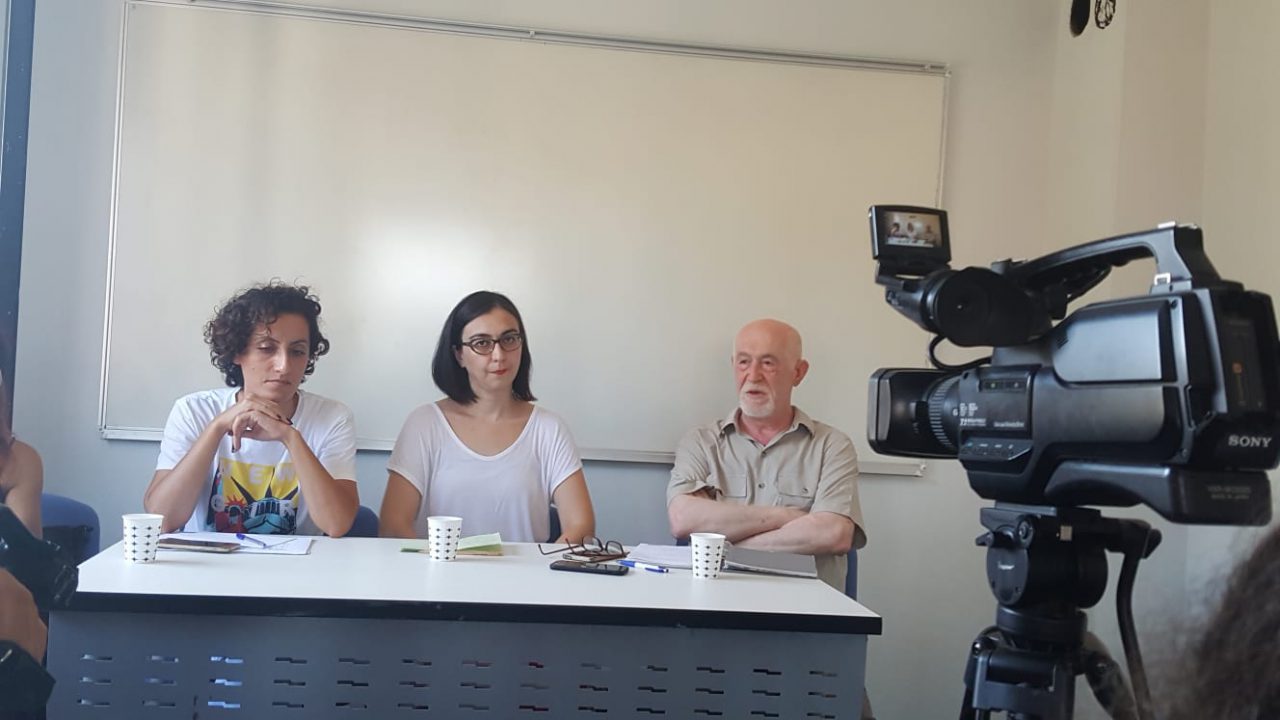Why Have Refugees Become Target?

In İzmir, assaults and lynch attempts against refugees have increased. Because of this fact, Konak Refugee Center held a conference called “Why Have Syrian Refugees Become Target?”
Nursen Arslan from Mülteci-der (Association for Refugees), Yıldırım Şahin from Halkların Köprüsü and Deysem Siti from Konak Refugee Center participated as speakers in the conference. We interviewed the moderator of the conference, Cavidan Soykan, about the increasing opposition against refugees.
Could you tell us briefly about yourself?
I was a lecturer of human rights in Ankara University, the Dept. of Political Sciences and Public Administration until 7 February 2017. On February 7, I was discharged from my job due to a decree law enacted during the state of emergency. I studied political science as a bachelor’s and master’s degree. I completed my doctorate in the University of Essex, Dept. of Sociology. My doctoral thesis was a study on sociology of law. I analysed the asylum system in Turkey regarding the relationship asylum-seekers and refugees coming from different backgrounds establish. As a result of my study, I realised that class, ethnicity, language, gender, religion, age and place could lead to discrimination of seekers’ in different ways. I also had the opportunity to thoroughly analyse Turkish Republic’s immigration policies since its foundation and Turkey’s first asylum act called Law on Foreigners and International Protection. I started working with asylum-seekers and refugees in 2008 as a field study for my thesis and I still continue my studies. This year, I attended workshops aimed at women Syrian refugees in Antakya and Mersin. Those workshops focused on their legal rights in Turkey and places to go in case of any abuse or violent act. I also contributed to a guide prepared for NGOs working with women Syrian refugees.
What do you is the cause of increasing opposition and tension against Syrian refugees, although they have been here for almost seven years?
Maybe, it would be wrong to say that this tension increased only recently. We know that there had been other incidents such as the last one in Bornova, İzmir. There had been other incidents in Ankara, Gaziantep and so on. That’s why, we cannot say all those were singular. Although reflected quite the opposite in the media, all of those incidents were lynch attempts, which had political and social background, against Syrian refugees. Instead of catching the criminals, either Syrians were sent to another neighborhood or had their damages recovered and that is all. I think this anger is the result of permanent stays of Syrians, because since 2011, they were defined as guests of this country. Syrians are exploited as cheap workforces, this causes anger among the unemployed. “Rents have increased since the Syrians came”-this is also another cause of anger. The main reason of all those problems is the lack of an integration policy which helps refugees to find jobs according to their education and talents, aims at solving their accomodation problem, provides equal access to educational and health rights. Neither Turkish people are informed about Syrians and their culture, nor Syrians know their rights in Turkey.
Turkey does not accept international refugee status, but also does not give enough information about its asylum system. False facts about Syrian refugees on social media are a result of this problem, I think. Media does not give a good account, too. Particularly in local press, we may encounter news that blames and criminalizes Syrian refugees. We don’t see any definition such as “Turkish” when reading about a theft, but if the criminals are refugees, then comes the label “Syrian thief” right away. This discriminating language unavoidably causes anger that has social and political background to be directed at Syrian refugees as a group. In truth, incidents that included Syrians were only 1,32% of total crimes committed between 2014-2018.
What would you like to say about the language politicians, media and other institutions use when referring to Syrians? Or any political discussion including the refugee issue?
Political parties neglect refugees’ needs and demands because they don’t vote and are not seen as citizens by the municipalities despite of the municipal law. General discourse during electoral period was about sending of our Syrian “guests” to their countries as the war ends. When talking about Syrians, we hear a certain emphasise on temporarity. Almost nobody talks about thousands of Syrians who were born and raised here and who might want to continue living in Turkey. There are a few media workers and deputies who talk about the problems Syrians face on accessing rights to health, education and labour. I think that reporting especially some good practices would affect both Syrian and Turkish society positively. We never see any news coverage about the activities of NGOs founded by Syrians or Syrian artists’ pieces of art produced in Turkey. Instead, their criminal records are featured almost only.
What would we demand from the state about factors that led to the latest increase in tension against Syrians?
As far as I see in the field, not only Syrian refugees but also other asylum-seekers know almost nothing about their rights and responsibilities in Turkey, because they are not informed properly. It is a must to have a system that provides facilities for integrating and applying for citizenship in Turkey. Before that, Turkey has to accept refugee status. On the other hand, the public should be informed about refugee status and what rights people with temporary protection and conditional refugee status have, so that false facts on social media do not have much effect. CSOs’ and academicians’ ideas can also be asked.

Bizi Takip Edin